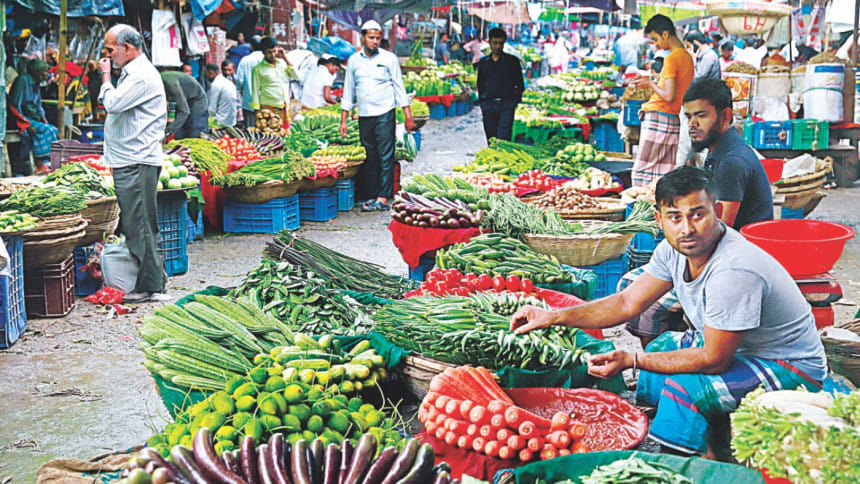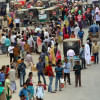Businesses hit hard by strike

Businesses incurred massive losses following the two-day countrywide transport strike that almost stalled the mobility of workers and goods.
"The most affected sector is the garments one as production in the factories was halted because the workers could not join their workplaces timely," said Shafiul Islam Mohiuddin, president of the Federation of Bangladesh Chambers of Commerce and Industry (FBCCI).
Apart from that, the transportation of exportable goods from Dhaka to Chattogram port was also affected as not a single truck was allowed to carry goods over the last two days.
Some 12,000 to 15,000 goods-laden trucks or covered vans ply between Dhaka and Chattogram port every day, according to industry insiders. Of those, 80 percent are engaged in carrying either export or imported textile and apparel items, they said.
The direct loss only to the garment sector is estimated to be Tk 723.68 crore a day ($1=Tk 85.14), said Siddiqur Rahman, president of Bangladesh Garment Manufacturers and Exporters Association (BGMEA).
So, the loss of the sector over the last two days is Tk 1,447.36 crore, he added.
The BGMEA chief also said that now the garment factory owners would have to bear the cost of expensive air shipment for the timely delivery of goods to the buyers, which would mean they could not make profit as it was much higher than seaway fares.
"We fear [that] expensive air shipment or having to give discounts to the buyers due to delays in delivery of goods," he said.
For instance, sending a kilogram of garments item to any airport in Germany from Bangladesh costs between $2 and $2.5, he said.
The airfares from Bangladesh to the US were much higher than in Europe, with export prices of T-shirts reaching $4 to $5, which is almost the level of airfare of a kg of garment items.
The seaway fare for sending a kg of garment items from Chattogram port to any destination in Europe varies between $0.25 and $0.30, industry insiders said.
"So no one can make profit in case of air shipment," Siddiqur said.
Following disruptions in Chattogram port or due to damage of scanning machines in the airport in Dhaka, Bangladeshi exporters sent 1,87,762 tonnes of goods by air in fiscal 2015-16, according to Bangladesh Freight Forwarders Agencies Association.
Meanwhile, the FBCCI chief could not estimate the loss incurred by other businesses but said that it was also felt in the domestic markets.
For instance, food items and perishable goods like vegetables and even baby food items could not be transported due to the strike, he said.
"We, the businessmen, do not like such [a] situation. We want a peaceful and long lasting solution through discussions. If the transport workers think they are not treated well in formulation of any law, they have the room for discussion to resolve the crisis. They need not turn to any anarchism," Mohiuddin said.
GROWERS FEEL THE CRUNCH
Vegetable growers in Mahasthangarh Bazar in Bogura suffered an estimated loss of Tk 4 crore in the last two days due to the work stoppage by transport workers, while wholesalers had also stopped procuring any goods from them.
The prices were three times lower in the Bazar, which is the largest wholesale vegetable-market in northern Bangladesh.
Khwaja Mia, 55, a farmer at Bogura's Shibganj village, who went to the market on the first day of the strike without knowing about it told or Bogura correspondent over the phone “I took five maunds of yardlong beans and 15 maunds of brinjal to the Bazar...The wholesale buyers were not interested in buying my vegetables, so I later sold everything at a rate three times cheaper than the market price of the day before.”
Another farmer, Rafiqul Islam, of the same upazila, brought 10 maunds of radish and sold it at Tk 200 per maunds instead of the previous price of Tk 800.
Meanwhile, wholesalers are counting their losses from unsold, damaged stock of goods.
They have also stopped buying new stock as they cannot supply those to Dhaka.
Zahidul Islam, a wholesaler, said, “Almost 36 hours ago I bought various vegetables worth Tk 600,000. A portion of it has already has rotted. If I can't send them within another 12 hours, I will lose everything I invested.”
Another local trader, Gopal Chandra Shah, said, “I have been doing this business for the last 20 years. Before this strike, there had been hartal during which I could send the vegetables at night, but this time the workers have been so strict, I could not send anything. I will face heavy losses.”
Khayrul Islam Khaza, treasurer of the Mahasthan Bazar's Aartadar Samity, said, “Everyday, we send almost over a hundred vegetable-laden trucks to Dhaka and other districts of the country. For the last two days, the wholesalers of the markets bought vegetables worth two crore at the lowest price.”
In Dhaka, Delwar Hossain Kusum, office secretary of Karwan Bazar Aratdar Samity, an association of wholesalers, said the strike did not impact vegetable prices in the wholesale trade there.
“Supplies from Dhaka's surrounding areas, such as Savar have come. That's why, we do not see any impact,” he said.
A senior official of the country's largest retail chain, Shwapno, echoed Kusum's views. “We have not seen an impact to that extent. Vehicles have somehow managed to come from the growing regions...,” he said.
Our Bogura correspondent contributed to this report.

 For all latest news, follow The Daily Star's Google News channel.
For all latest news, follow The Daily Star's Google News channel. 








Comments